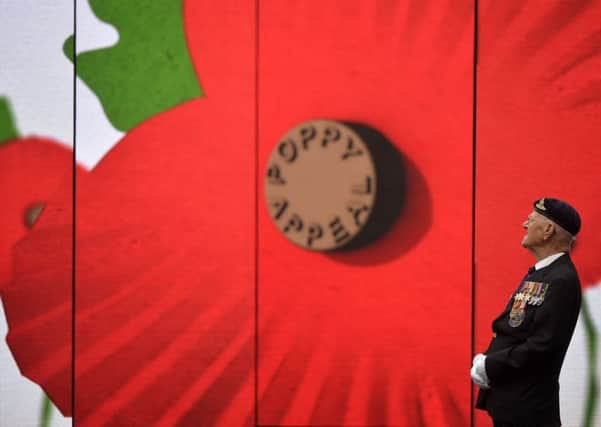YP Letters: Ahead of Poppy Day, hat do we in UK know about peace?


THE White Poppy and the Red Poppy are two sides of the same coin. But how will we use it?
Both poppies have a great history. The White Poppy began to be sold in 1933. It was to stand for all war deaths, an end to wars, and for peace. This came after the 1928 international Kellogg Briand Pact where leading nations agreed to renounce and outlaw war.
Advertisement
Hide AdAdvertisement
Hide AdA hundred years ago, 90 per cent of the deaths in war were of soldiers. Now, the case for the white poppy is stronger than ever, as it is claimed 90 per cent of deaths in modern wars, are deaths of civilians. Of those ‘dying for their country’ now, only one in 10 are soldiers.
A lot of people do not know the background to the Red Poppy.
In 1918 when the men came back from war, they were furious. They had watched so many of their friends die – in slaughter – in murder as the last veteran told us a few years ago – in the ‘war to end all wars’ – and which didn’t. They had seen so many of their brave comrades cut down – lions led by donkeys.
Officials recognised that something had to be done to help defuse the anger of the hundreds of thousands of men, all trained in arms, who were returning to their country – and to be forgotten by the system.
Advertisement
Hide AdAdvertisement
Hide AdGeneral Haig was very aware of this anger and wished to support ex-soldiers but also to protect the status quo. So the Royal British Legion was born.
It soaked up the other ex-servicemen’s organisations – except, notably, the NUX, the National Union of Ex-servicemen, which survived until 1922. Soon Haig and the Legion adopted the Red Poppy – via America and France – and this was first sold around the country in 1921, in memory of the military dead.
In 1922 the hundreds of thousands of NUX members were encouraged to join the Labour Party, and others, to work for a fairer country.
In 1923, the Labour Party helped form the Government for the first time, and former servicemen became part of the first attempt to create a ‘land fit for heroes’. The question now is: in a country at war for most of this century, so far, and taught to hate enemy countries, and many groups of people, what do we know about peace?
Door open for the Lib Dems
From: Hilary Andrews, Nursery Lane, Leeds.
Advertisement
Hide AdAdvertisement
Hide AdSO the Tories are not going to contest the by-election caused by Zac Goldmith’s resignation over the third runway at Heathrow. This leaves the door open for a desperate Lib Dem party to play the whole procedure out as another Brexit vote as most of Zac’s constituents were Remainers. When will it all end? Time to trigger Article 50?
From: Coun Tim Mickleburgh (Lab), Boulevard Avenue, Grimsby.
GIVEN the amount of pollution air travel causes to the environment, I’m not really in favour of any airport being expanded. Certainly not Heathrow, which will further increase the economic dominance of London and the South East.
If we must see further development, then it should be at one of the regional sites. They could then be connected to the capital by improved rail links. Mind you, with Skype and other forms of electronic communication, there should be less need for people to fly.
Still proud to be British
From: Brian Sheridan, Redmires Road, Sheffield.
Advertisement
Hide AdAdvertisement
Hide AdI AM very proud to be a citizen of the United Kingdom of Great Britain and Northern Ireland. However, I sometimes wonder if those who talk about putting the “great” back into Great Britain ad nauseam understand the meaning of the title. The “great” in Great Britain has nothing to do with the status or merit of the nation. Great Britain is an island comprising England, Scotland and Wales. Not only is UK as convenient as GB when filling in forms, it is more precise because it includes Northern Ireland.
The “Great” in Great Britain was never any more significant than the “Great” in Great Yarmouth. That is not to say we were never a great country: and contrary to what so many readers of this newspaper seem to think, we are as great as ever. If we were not, the EU would have been happy to unload.
Abbey more than gothic
From: Mrs Margaret Pennock, Robin Hood’s Bay, Whitby.
RE the front-page picture of Whitby Abbey (The Yorkshire Post, October 26).
Whitby Abbey was “famous for” many things long before Bram Stoker and his Dracula.
Advertisement
Hide AdAdvertisement
Hide AdFor example in AD664 it was at the Synod of Whitby that the dating of Easter was fixed. The Abbey at that time being administered by a woman – Lady Hild (Hilda). Not sure if she would approve of the Halloween theme!
Losing touch with goodness
From: Chris Schorah, Gascoigne Avenue, Leeds.
I SUPPOSE that GP Taylor is correct in noting that a society, which has ‘lost touch with the divine’ and rejected Christian spirituality, will seek these things elsewhere, such as in Halloween (The Yorkshire Post, October 26).
What a tragedy that in doing so, our culture actually honours death and evil, the very things that Jesus overcomes for all those who are prepared to accept and follow him.